The Smothers Brothers
Who did Mom like best?
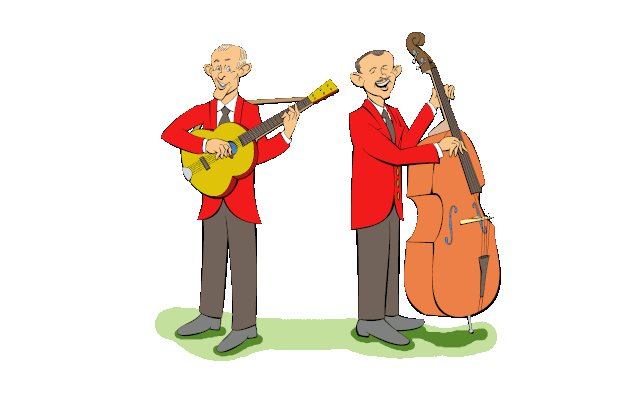
(Click on the image to zoom in and out.)
Comedy and popular music have always gone together. But the modi laugherandi vary considerably. Sometimes it's simply singing humorous songs as did the country music duet Homer and Jethro in their version of the Woody Guthrie classic "So Long (It's Been Good to Know You):
We'll sing you a song and here's the first verse.
It's gotta get better, it can't get no worse.
So loan us your ears for a minute or two,
And we'll give 'em right back just as soon as we're through.
Of course, the alternative is to insert jokes between or even during songs. Fans of the old TV variety/comedy show Hee Haw remember the "Pickin' and Grinnin'" sessions with Buck Owens and Roy Clark. While playing a spirited rendition of "Cripple Creek", they'd suddenly stop.
| Roy: | I hear old Archie got hisself a job over at the candle factory. |
| Buck: | Yep. He works there every Saturday and every Sunday. |
| Roy: | Just Saturdays and Sundays? |
| Buck: | Yeah. |
| Roy: | That's a weird schedule. |
| Buck: | Well, Roy, at a candle factory you only work on wick ends. |
But trading zingers goes back long before the boob tube. In the 1920's during their lively performances, you might have heard Uncle Dave Macon and Sid Harkreader stop a tune and say something like:
| Sid: | Hey, Dave! Did you just see that pretty girl in the first row smile at me? |
| Dave: | That don't mean nothin', Sid. When I first saw your face I laughed out loud. |
But the most famous comedy folk song group has to be the Smothers Brothers, Tom and Dick, who really are brothers. Even though their now famous television show was controversial for its perceived criticism of the then current United States government policies and public figure, most of their songs avoided contemporary references. Instead much of it was based on brotherly banter.
| Tom: | Mom always liked you best. |
| Dick: | Why do you keep telling me, "Mom always liked you best"? |
| Tom: | Well, Mom always did like you best! |
| Dick: | Well, do you want to know why she liked me best? Sure she like me best. Why not? |
| Tom: | I didn't know Mom liked you best! |
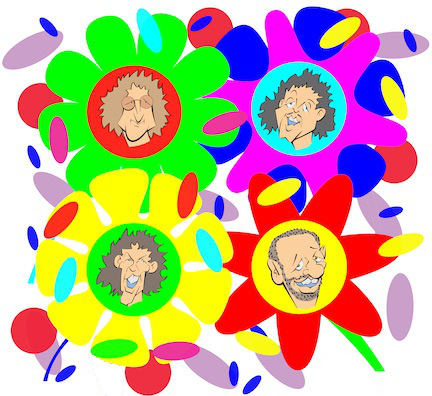
The Beatles
Some of their humor does have references to popular culture. When they were performing during the 1960's after the Beatles had become a true phenomenon, Tommy made a reference to the "Beatlemania" which among other things got young people buying Beatle wigs.
| Tom: | We couldn't have Smothers wigs. |
| Dick: | No, we couldn't. |
| Tom: | Because of our hairlines. So we're going to have plastic ears. |
Sometimes Tom would insert wisecracks or otherwise "ruin" a song. In "I Never Will Marry", they sang the song completely seriously and Tom concluded with a spoken ending.
The girl I learned to love so very much
Broke my heart and left me for another man.
Yet I love her still.
I swear by all the stars in the sky
That as long as I live,
I never will marry
Unless I can marry her.
I'll mess around a little bit though.
The Smothers Brothers were two of the three children of Major Thomas Bolyn Smothers and Ruth Remick. Thomas was a West Point graduate and reached the rank of major during World War II. However, he was taken prisoner by the Japanese in 1942 and endured the Bataan Death March only to die as a prisoner of war in Japan only months before the end of the war. He was being transported in a convoy which came under attack by the Allies. The boat he was in was hit and sank.
The other Smothers Sibling was a Smothers sister, Sherry. Yes, they were Tom, Dick, and Sherry. With the difficulties of being a single parent, their mom sometimes had the kids stay with relatives. Despite his addle-headed on-stage persona, Tom was actually the most responsible of the kids and helped take care of his younger brother and sister.
All three siblings began singing informally by themselves, with friends, and then at church pageants. Tom had trouble learning to read music and in fact later learned he was dyslexic. So he learned to play and sing by ear.
Their "big break" - in high school - was when the vocal teacher more or less drafted them into the small and select madrigal group. Both boys could sing either bass or tenor and Tom opted for the former and Dick the latter. Tom credited Dick's vocal skills with what really got them singing seriously and when he went to college, he made sure Dick was still part of the act. Soon they teamed up with a musician from Australia named Bobby Blackmore and they began performing around campus as the Smothers Brothers and Gawd.
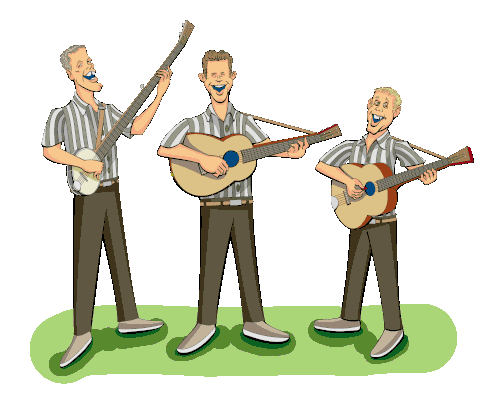
The Kingston Trio
Tom was 21 and Dick was 19 in 1958 when the Kingston Trio had their hit "Tom Dooley". They saw the resultant but unexpected folk music revival - or folk craze as some call it - as a perfect venue for their act. And THE place for newcomers to break into show business was the Purple Onion night club in San Francisco.
So the Smothers Brothers and Gawd auditioned for the manager, Barry Drew, and he liked what he saw. He particularly enjoyed the humorous and usually rambling introductions by Tom which were a deliberate parody of the Kingston's Trio introduction to "Tom Dooley".
To get a fuller sound they decided Dick had to learn to play stand-up bass. But since the strings were the same as the lowest four strings of the guitar that was no real problem. The act consisted of Tom, Dick, and Bobby singing three songs in fifteen minutes, three times a night. In their performances Dick just played bass but didn't speak. That was mostly Tom's job with some banter from Bobby.
The Smothers Brothers and Gawd soon became the Onion's most popular act. Officially Sherry wasn't allowed to sit in the audience since she was under eighteen (the Purple Onion served drinks). But they snuck her in anyway.
The original contract had specified a stint of two weeks with an option for a renewal. But they were so popular they kept getting extensions and ended up playing at the Purple Onion for three months. Other offers came from other clubs and - one of the most lucrative jobs - for high school graduation shows. They might get $150 for a single night which Tom said was a fortune for them.
The act began getting good reviews. But perhaps because the act's full name seemed mildly sacrilegious, the critics usually referred to them simply as the Smothers Brothers. Soon Bobby opted out of the act, got married, and moved back to Australia.
Despite their increasing success, Dick wasn't sure that he wanted to be a musician. He had also married and instead planned to go back to college and become a teacher. But then the brothers got an extended offer to play in Aspen, Colorado. They only got $100 a week each but they had room and board provided free.
They were performing for the first time as a duo and Tom took the role as the somewhat addleheaded sibling - some people even thought he was the younger - and Dick was the straight man (their "warm up act" the first night was a young teenaged singer named Judy Collins). None of the performances were rigorously scripted and soon they were playing to long lines and capacity crowds. After they finished the run in Aspen, they returned to the Purple Onion and again to packed audiences.
It was another and yet unknown comic that helped the brothers find a national audience. Bob Newhart had just started playing his comedy act at the Purple Onion but had moved on to the Tidelands Club in Houston. There he recorded an album, The Button-Down Mind of Bob Newhart, and it won the 1961 Grammy Award for Best Album. To Tom and Dick that a comedy record could be a best seller AND a Grammy winner was an unexpected revelation. They recorded one of their shows and played the recording for an executive of Mercury Records. He agreed to make an album and so Tom and Dick went to New York.
Of course, New York was the Big Time, and Tom and Dick were booked at the Blue Angel nightclub. One of the other comedians who was playing at the club went to Jack Paar, the host of The Tonight Show. He said Jack should have Tom and Dick on his program, but unfortunately, The Tonight Show was booked and they couldn't fit in them in.
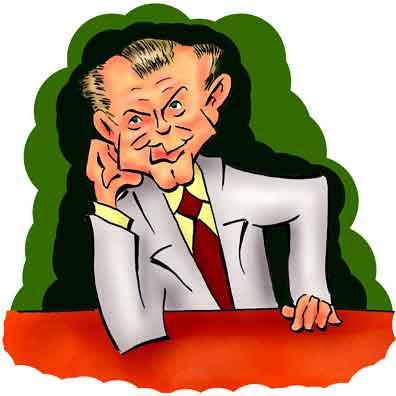
Jack

Johnny
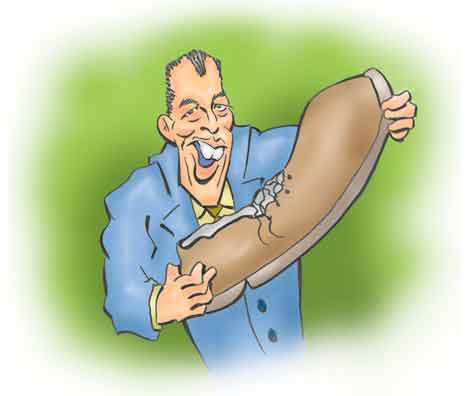
Ed
Then on May 24, 1961, one of the scheduled acts canceled. Tom and Dick were told if they could show up at 8:00 that evening, they could be on the show. Although Dick thought Jack's introduction was rather strange, they were a hit. Soon afterwards, Steve Allen, who had been the first host of The Tonight Show, offered Tom and Dick a regular spot on The New Steve Allen Show. The Smothers Brothers were stars.
By the mid-1960's Tom and Dick had become staples on the major television variety shows: Jack Paar, Bing Crosby, Andy Williams, Merv Griffin, Ed Sullivan, and The Tonight Show with Johnny Carson. Then in 1967, CBS offered them their own hour comedy show called (what else?), The Smothers Brothers Comedy Hour.
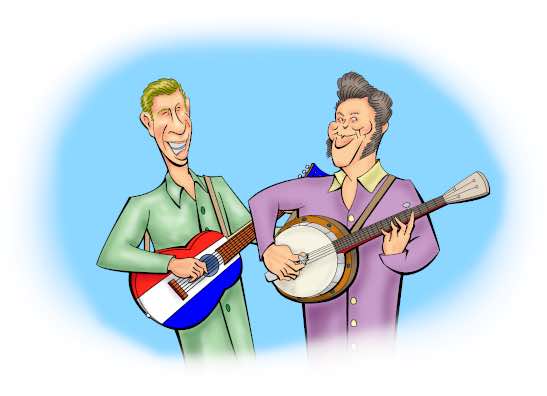
Buck Owens and Roy Clark
Pickin' and Grinnin'
Enough has been written about the show that was both popular and controversial and why it lasted not even three years to be canceled mid-way through the 1969 season. Less well known is that the show was replaced by Hee Haw. The irony is that with the stereotyped "hillbillies" lolling about, the constantly arguing and occasionally physical husband and wife team the Naggers, and the occasional "dumb blonde joke", Hee Haw would likely draw more fire today than the Smothers Brothers Comedy Hour ever did. But Hee Haw endured and was aired from 1969 to 1997.
References and Further Reading
Dangerously Funny: The Uncensored Story of the Smothers Brothers Comedy Hour, David Bianculli, Touchstone Books, Simon and Schuster, 2009.
The Folk Songs of North America in the English language, Alan Lomax, Doubleday, 1960.
The Smothers Brothers Comedy Hour, Internet Movie Data Base.